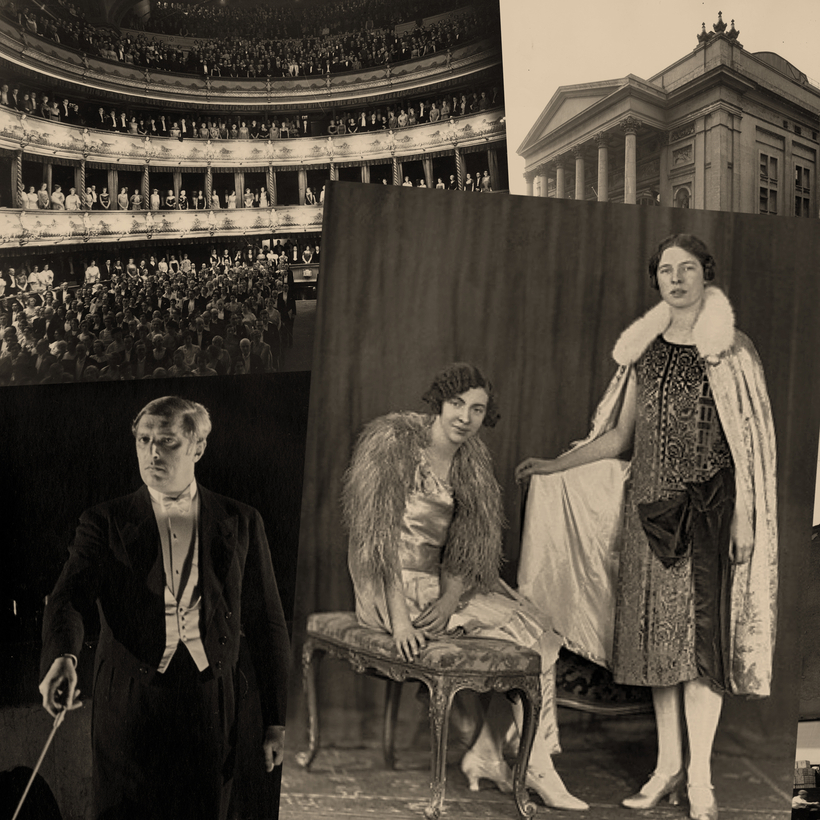I began researching Overture of Hope: Two Sisters’ Daring Plan That Saved Opera’s Jewish Stars from the Third Reich because I was fascinated with the audacious exploits of English sisters Ida and Louise Cook, opera fans who risked their lives to save Jewish musicians and scholars from the Nazis. (The Cooks mounted a private relief effort that spirited them out of Germany and Austria into England in the years before the beginning of the Second World War.)
During the 1920s and 1930s, in the spring seasons, these civil-service typists would spend their lunch hours queuing up for cheap seats and autographs outside Covent Garden’s Royal Opera House. It was there, on the eve of the London premiere of Richard Strauss’s Arabella, in 1934, that they met the Viennese conductor Clemens Krauss. (They’d asked for his autograph and photo; he’d obliged.)
The sisters soon grew obsessed with the darkly charismatic and ferociously ambitious artist. It was an obsession I soon began to share as I delved deeper into Krauss’s little-remembered life and discovered that he was one of the most complex and unlikely heroes of the Second World War.
Krauss, a musical prodigy who counted German composer Strauss as a mentor, was Adolf Hitler’s favorite conductor. Handsome, brooding, and imperious, he had few qualms about taking over the posts vacated by colleagues who were either routed by the Nazis or resigned to protest their rule. Hitler was so impressed with Krauss’s abilities that in 1936 he put him in charge of the Bavarian State Opera, in Munich, the centerpiece of culture in the Third Reich.
Rival conductor Heinz Tietjen, who headed the Bayreuth Festival from 1931 to 1944, described Krauss as “Hitler’s favorite, his blue-eyed boy.” Wilhelm Furtwängler, the dean of German conductors, was similarly derisive, noting in a 1936 letter that Krauss “possesses a certain cold elegance and a technique that is not without interest to experts, but beyond that he has nothing.”
Although he was never a Nazi, Krauss bragged of his close relationship with members of the party’s hierarchy and took advantage of the attendant perks. In the war-ravaged Third Reich, Krauss and his wife, the Romanian soprano Viorica Ursuleac, enjoyed the comforts of a lavish apartment at Salzburg’s Schloss Leopoldskron, the lakeside castle that was the setting for The Sound of Music.
They traveled throughout the Third Reich, and they frequently performed for Hans Frank, the Nazi governor-general of occupied Poland who oversaw four concentration camps and was executed at Nuremberg after being found guilty of war crimes and crimes against humanity. Krauss also conducted concerts for the Waffen-SS, and supervised radio programs in honor of the Führer’s birthday.
And he wrote numerous letters to Martin Bormann, Hitler’s secretary, seeking the use of apartments abandoned by Jews in 1942. There was a shortage of housing in war-torn Munich, and Krauss needed the empty homes for the musicians and singers he brought from Austria and all over Germany for the Bavarian State Opera, he said.
“He was given all the power he wanted which no other musician got in the Third Reich and he used this power without scruples,” wrote Otto de Pasetti, a U.S. intelligence officer who investigated Krauss after the war. “Krauss was the most powerful musician in the Third Reich.”
Imagine my surprise, then, when I discovered, through my research of Ida and Louise Cook, that Krauss was also a hero.
Ida called him “the mainspring of our work” in a 1964 letter to Yad Vashem, Jerusalem’s Holocaust memorial, which honored the sisters for their bravery during the war. According to the Yad Vashem letter and Ida’s other correspondence I found scattered in archives around the world, Krauss was actually the one to secretly set them on their relief work.

After meeting the sisters on that day in 1934, Krauss scheduled operas as a cover for their weekend visits to Berlin, Munich, and Vienna, where they met with Jewish refugees and plotted to smuggle their jewelry and furs—often their only capital—into England. The Cooks arrived with empty suitcases for their weekends at the opera, and crossed the border back to England wearing the fur coats and diamond jewelry of the refugees they later brought to safety.
Aided by the women he dubbed “the Cook mädels [lasses],” Krauss and Ursuleac risked their own lives in an underground effort that saved 29 Jews.
But his heroism went unknown. After the war, Krauss was the subject of a denazification trial and banned by his music-world rivals from conducting opera in Austria. He took up guest appearances around the world, even as demonstrators massed outside concert halls screaming “Nazi” wherever he went.
His health suffered, and he scrambled to make a living. Krauss died of a heart attack at 61, after he appeared as a guest conductor at the Orquesta Sinfónica Nacional, in Mexico City, in the spring of 1954. Mexican authorities insisted upon paying tribute to the great conductor, and offered the stage at the neoclassical Palacio de Bellas Artes, where Krauss could lie in state before his body was shipped to Austria for burial.
In an odd about-face, the Austrian authorities insisted upon a formal state funeral for Krauss, offering to bury him next to Beethoven and Schubert, who both died in Vienna. Krauss’s widow refused the distinction, blaming his postwar treatment by vindictive Austrian authorities for his untimely death.
“The Viennese are extraordinary towards their great men,” wrote Ida in a letter to a friend after Krauss’s death. “They break their hearts, but they bury them splendidly.”

Isabel Vincent is an investigative reporter for the New York Post and the author of several books. Her latest, Overture of Hope: Two Sisters’ Daring Plan That Saved Opera’s Jewish Stars from the Third Reich, is out now

